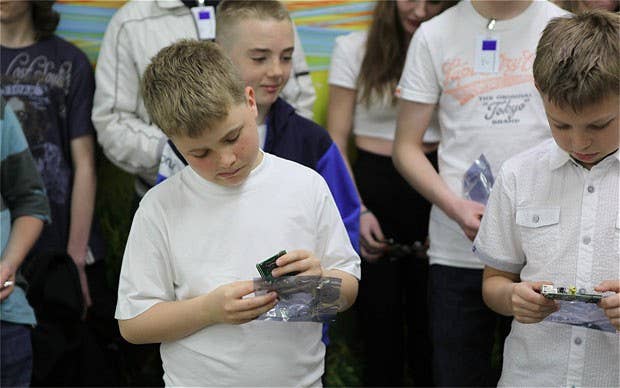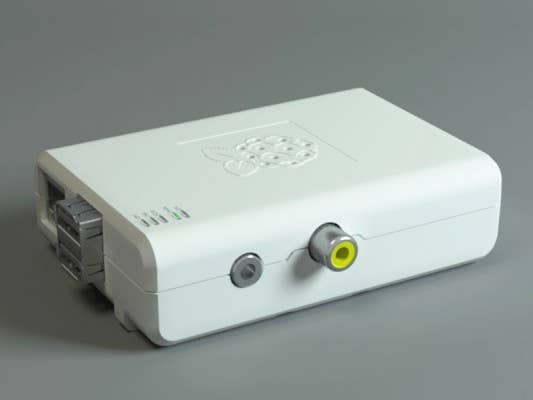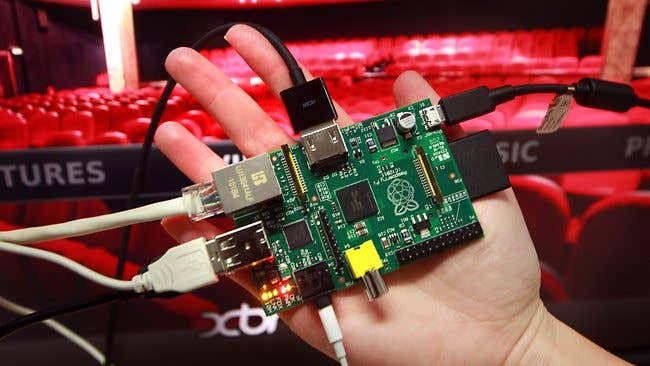Getting Everybody a Piece of the Pi
David Braben on meeting demand for the innovative device, and where it goes from here
Thirty or so years ago, a new consumer electronics device pulled back the curtain on the mystery of computer programming in Great Britain, introducing coding to a generation of children who went on to run some of the next few decades' most impactful and profitable companies.
That device, the BBC Micro, is now enjoying much a deserved retirement from the front lines, but its legacy lives on. With the need for a new generation of code-literate young graduates threatening to derail not only the UK's games industry but any business in need of software engineers, several alumni from the school of BASIC decided it was time for a new, affordable introduction to coding.
So the Raspberry Pi was born. Now, with the UK government promising to shake things up in the curriculum, and waiting lists packed since the device's launch, it's time to shine.
Here, Raspberry Pi Foundation member and head of Frontier Developments David Braben talks about why the project is so important, and where it's heading next.

The numbers have been fantastic - they've gone through the ceiling. Just before Christmas we had made a batch, funded from our own pockets, of just 10,000. We saw this tidal wave coming towards us, so we've been talking to the great guys at Premier Farnell and RS Electronics, who do distribution for us, and they've been great at getting things off the ground quickly, and they're making vastly more numberwise.
Well it's already scaled up, in that sense. What I think will happen, when we move towards an educational consumer device, which we haven't yet got a date for, but we're hoping will be the back end of this year, we'll have a case and friendly software - we'll scale up again then.
That's right. What we will do, for people who already have them, we'll make sure we roll out software to them. But yes, the fact that it doesn't have a case means it's not really child friendly, but it does have a certain beauty.
The nice thing about the machine being stateless is that everything is on the SD card, you don't need to update the machine.
It does, and we'll continue to offer that caseless version.
Well the software updates are really easy already. The only problem at the moment is that you need some way of getting the image on to an SD card. One of the things we're trying to work away from is requiring a PC. The thing is, if you're a school, you can just put the image on a load of SD cards and Bob's your uncle, the machine is updated.
The nice thing about the machine being stateless is that everything is on the SD card, you don't need to update the machine.
No - I think it's part of it, but I don't think it's the only key thing. When we were looking at this we were thinking, how do we get kids to learn and be creative with technology? Ironically, one of the things which we thought about was that buying a BBC Micro from Ebay was still the best learning computer. If you do something wrong you can press the Break button and you're back to square one in a few seconds.
In classrooms, that's very important, especially going from one lesson to the next. With the BBC Micro, using what was then called ethernet, a teacher could deploy, very quickly to all the machines in a classroom, a piece of software. The machines are all then in a known state, so if a kid does something wrong, you can just redeploy it.

That philosophy is very important in education, but it's sort of anathema to the PC, because it's not a million miles from a computer virus: a machine remotely deploying software to all of your machines! It can be done, but the complexity of setting that up is harder and it doesn't really give the same freedom to the kids. What we're trying to do is build a fundamental comfort and confidence with the technology.
I think there's a surprising amount of technophobia amongst kids - I know a lot of people will see that comment and say, 'no, that's not true' because they're constantly playing with apps on an iPad or a mobile device or an Xbox, but when it comes to changing any settings, they're actually very wary. Especially on a PC, which we've all learned is actually quite a fragile device once you start editing batch files.
In many ways, the Raspberry Pi as you see it now comes across as quite a frightening machine, because you see this Linux boot sequence. But that happens on mobile phones too, it's just hidden from you.
Well it fires up into a Linux desktop anyway, which isn't a million miles away from what people are used to. But the intention here isn't to replace the PC, that's never been our intention, it's to provide something new which allows you to play around and learn.
If you think of content creation as a stairway, we already have the first step, because a lot of games support user generated content already. The amount of take up on that sort of thing is already huge.
The trouble is that the next four or five steps on the staircase are missing. They used to be provided in school, with that structured learning, or a knowledgeable parent helping a child past that stage.
Then the sixth or seventh step would be provided by something like XNA, there are a lot of learning tools, things like Arduino, where you'll really need a helpful adult to get you there, but once you're there you can pull yourself up on to the sixth or seventh step and then you can start downloading compilers and buying more complex tools - then you're self-sufficient, then you can program.
It's getting past those stages that's difficult. For me, personally it was things like BBC BASIC that worked, so we hope to offer BBC BASIC on Raspberry Pi. The point is, that you need something like that. It's showing you the familiarity, showing you what happens under the bonnet in a very simplistic way.
We, well, other members of the foundation, took a class live on BBC for half an hour where we wrote the game Snake in Python. It was great, the kids really engaged with it, they were really enthusiastic about adding a second snake or changing the colours. I think that's the thing: getting that enthusiasm to create things from scratch, the understanding that these things aren't actually rocket science, they aren't that terrifying.
Hopefully, down the line, we'll get a new generation of interested children. At the minute we've got a gap.
Hopefully, down the line, we'll get a new generation of interested children. At the minute we've got a gap. Since 2000 people haven't been signing up for computer science courses. I'm sure it's affected the other stem subjects as well. That is a real problem for the country.
There was a lot of damage done to the education system by the introduction of ICT. What we're trying to do is to provide, almost, the antidote. Now unfortunately that gap of ten years or so will remain, but at least we can start increasing numbers again so that there will be people coming through, in ten years or so, who do have an understanding of technology.
Well, our objective isn't necessarily to get the Raspberry Pi into schools, we're providing it as a tool to make things more practical. What we really want is to see the return of proper computer science teaching. A lot of people have been great for this, not just the Raspberry Pi foundation. The British Computing Society and a lot of other people have worked really hard for that and we've now got agreement from Michael Gove that the curriculum is going to change in September - that's really good.
So the way we see it is that we're supporting that. We've already got teachers from 1100 schools around the country signed up to actually teach computer science. I realise that's a small percentage of the total, which I think is around 5000 schools, but it's a very good start. What we're trying to do is put in place courses which will upgrade the skills of existing teachers. The government in September is still mandating the teaching of either computer science or ICT so that the teachers can continue. The real horror would be to see teachers laid off - that's not happening.

There'll be the opportunity to upgrade their training so that they can actually teach computer science, and I think they're really up for that - actually most of them could already do it. The more we can get signed up for that, the better.
As in all things, to expect it to change overnight is unrealistic. But we can expect it to start to change. That's realistic. That's what we're doing.
Yes. One of the reasons we put an old fashioned style analogue TV connector was that a number of charities got in touch with us and said, this would be great for us. From a practical point of view, laptops don't survive very well in unfriendly climates, where it's damp or sandy or dusty. Also, you put things in the back of a Landrover at the start of a journey and at the end you get a bag of bits. At least with one of these you can put it in your top pocket. Even if you reverse a Landrover over it, you've only lost yourself a relatively small amount of money.
David Braben will be talking about Raspberry Pi at Develop in Brighton, which takes place July 10-13, 2012. Book before June 13 for Early Bird discount rates.









